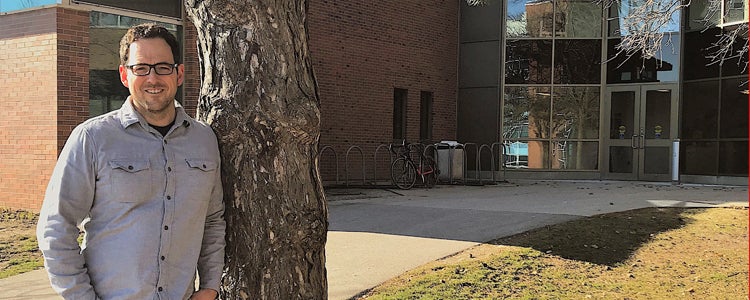 |
|
Bryan Grimwood, Recreation and Leisure Studies |
Imagine the surprise as Bryan Grimwood instructs his outdoor recreation and leisure course (REC 230) of 100 students to head outside for a silent walk around campus. The students collectively embark on what Bryan calls “an experiment of the senses.” Students are encouraged to view campus with new eyes, to observe every sight, smell, taste, and feel without judgment. The class observes the movement of people and critters as they flow through campus. This experiment is just one of the many place-based, experiential learning activities Grimwood features in his courses.
Experiential learning hasn’t always been easy for Grimwood to facilitate in his courses. “It can be really hard to incorporate into the university setting. Especially when you are teaching courses with 100+ students,” Bryan explains. He describes the first time he taught an outdoor recreation and leisure course. “It was a three-hour lecture in a windowless lecture hall . . . the complete antithesis of outdoor recreation,” he laughs. Grimwood quickly altered the structure of the course to include weekly outdoor seminars with hands-on learning to promote curiosity in his students. With experiences in outdoor education, facilitating wilderness expeditions and residential summer camps, Grimwood is well acquainted with the growth and learning that occurs when groups of people are together in nature.
“Dr. Bryan Grimwood is an incredible professor who understands that the learning process not only takes time, but also is most effective when students are able to learn through developing relationships with one another while performing a task that they can reflect upon after. Dr. Grimwood understands academia as a discussion that stems from experiences and thoughts that students are able to develop on their own.” – Brandon Pludwinski, Master’s student in Recreation and Leisure Studies
Bryan Grimwood sees teaching as a form of mentorship, of mentoring committed and passionate life-long learners. For Grimwood, mentorship involves identifying the hook that captures students’ curiosity and draws them in, then providing students with the opportunity to further explore their curiosity. Grimwood does this by allocating space within his courses for students to focus on their own interests and passions. He provides clear expectations on assignments, yet creates flexibility and room for student choice within the established criteria. For example, in his third-year qualitative methodology course, students take ownership of their learning by identifying specific content they want to learn about. In this way, process skills, as opposed to content, are the focus of the courses. “I’m hesitant to tell students what they need to know in terms of content,” he explains. Instead, he sees his courses as providing students with a platform to explore values and think critically.
Creating room for students to take ownership of their learning isn’t always easy, Grimwood notes. It involves an element of risk and requires that he trust in students’ capacities to commit and engage. It also requires a lot of trial and error, as well as careful attention to student feedback. “It’s important to be receptive to student feedback and learn from that,” he says. Ultimately, providing options and flexibility within the course outline has resulted in more passionate and engaged learners.
This philosophy translates into Grimwood’s research on tourism and Indigenous livelihoods. When working with communities, he actively strives to take on the role of a learner and facilitator, as opposed to the expert. He approaches his research and teaching relationships as opportunities for learning together. Grimwood believes it’s important for him to be comfortable moving away from being the expert professor at the front of the room and toward being a mutual learner in the classroom and in his research. “When I go to class and feel excited about interacting with the students,” he says, “that usually translates into students who are learning and really getting something out of the class.”
Watch a one-minute YouTube video in which Bryan Grimwood talks about his teaching practice.